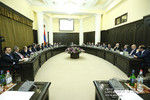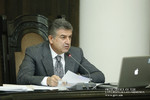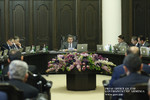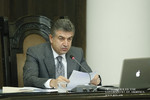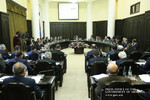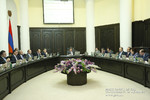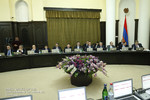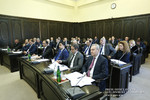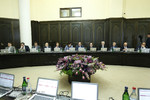Thursday, 3 November 2016
PM issues instructions on road traffic control systems and paid parking operations
A regular Cabinet meeting was held today, chaired by Prime Minister Karen Karapetyan.
Before discussing the issues on the agenda, based on the results of a consultation held with the President of the Republic of Armenia, the Prime Minister gave a number of instructions regarding road traffic control systems and paid parking operations,.
“I instruct:
1. The Head of the Police Force by the Government of the Republic of Armenia: to negotiate with the management of Security Dream Ltd involving, as appropriate, the representatives of the ministries of Finance and Justice in order to provide a legal solution within a week’s time over the transfer to State agencies of the functions exercised in the form of ownership, including full disposal and management of financial flows.
2. The Minister of Finance and Minister of Justice: to assist the Mayor of Yerevan in the talks with Parking City Service and Locator CJSC consortium with a view to submitting within a week’s time a legal solution over the transfer to communities of the functions exercised in the form of ownership, including full disposal and management of financial flows.
3. The Head of Police Force by the Government of the Republic of Armenia shall:
1) Submit by November 30 a concept note on traffic police reform, providing specific deadlines and measurable tangible results.
2) Together with interested State and community agencies: investigate and submit proposals on introduction of new quality criteria for traffic control and regulation of paid parking services.
4. The Minister of Justice shall discuss and submit within a 20-day deadline:
1) Proposals on introduction of effective tools for proper notification of seizure on account of non-payment of administrative fines;
2) In cooperation with the Police Force by the Government of the Republic of Armenia: submit proposals on improvement of mechanisms of notification of administrative fines.
The Prime Minister gave the Ministry of Justice a number of instructions concerning the fight against corruption, stemming from the government’s program. “The first instruction concerns the criminalization of illicit enrichment. In cases when an official’s assets significantly exceed his / her legitimate income, he or she should be prosecuted. I instruct the Minister of Justice to submit a draft within two weeks.
Second, it is necessary to introduce a bill to limit the scope of cash transactions along with the draft on illicit enrichment. The so-called false borrowings and false donations are mostly carried out in cash making it practically impossible to trace back the process. In many cases it is not clear whether the person actually received the loan stated in the declaration.
To cope with these problems, I am instructing the Minister of Justice, in cooperation with Central Bank of the Republic of Armenia, to submit a bill on restrictions of cash transactions within two weeks’ time.
The third assignment relates to the improvement and reorganization of the specialized anticorruption body. Firstly, we need to expand the powers of the Ethics Committee of Senior Officials covering both educational and corruption prevention functions.
In addition, we need to enhance transparency and accountability in the activities of those law enforcement agencies fighting against corruption. To this end, the law should provide that these agencies report back their activities every year. I hereby instruct the Minister of Justice to submit a relevant bill within one month.
Fourth, I think it necessary to address the expansion of the scope of the officials eligible for income declaration. A wide range of public officials, including members of government, judges, etc., are supposed to submit a declaration, while there are many officials, not included in this list, who are involved in public procurements, or various other “risky” activities.
Therefore, I give the Minister of Justice three weeks to submit s proposal on expanding the scope of those persons supposed to present income declarations proceeding from risk considerations.
The fifth recommendation concerns the so-called indicators’ system. The study of the experience available in this field in other countries shows that the classical approach may not be so effective in our country. The practice of moving them from one village to another for defense purposes may not be effective in Armenia. Therefore, I give the Minister of Justice two months to develop effective ways to introduce the system of indicators.
Sixth, I instruct the Minister of Justice to hold meetings with the representatives of civil society, the opposition and all stakeholders and, if necessary, submit a recommendation on the principles of formation of the Anticorruption Council, as well as on the change of its composition.”
With reference to the public order and healthy lifestyle, Karen Karapetyan said the public concerns and the results of the study on the sale of tobacco products and alcoholic beverages to persons under 18 years of age are quite worrisome. “Under the current legislation control in this matter should be implemented by local authorities, who are authorized to impose administrative penalties on the sale of tobacco products and alcoholic beverages to persons at the age of less than 18 years. I suggest local authorities ensure appropriate control in this matter. In this regard, it is also necessary to pay attention to cafes, clubs and other entertainment venues,” the Prime Minister said.
Coming to the changes in gas tariffs, the Premier said that neither the budget nor the government subsidize gas distribution companies. “Tariffs are as follows: consumers in excess of 10,000 cubic meters shall pay USD242.1 instead of USD257.56. If the organization uses more gas than it did in the past, the tariff for excess consumption can be 212 dollars. Thus, Gazprom Armenia makes an attempt to motivate the market so that the market and business could expand in a way business could become profitable at its cost due to the growth of the market.”
For consumers of less than 10,000 cubic meters the tariff will be 139 instead of 146.7 drams, while vulnerable households will have to pay only 100 drams for a cubic meter of gas. Karen Karapetyan instructed the Ministry of Labor and Social Affairs, together with Gazprom Armenia, to finalize the list of socially vulnerable by 1 January, 2017. As for greenhouses and enterprises-processors of agricultural products, the price of gas will be 212 dollars instead of USD 257.56. The 45-dollar decrease in tariffs will help these companies expand.
According to the Prime Minister, there are for key factors behind the decrease in gas tariffs: First, on January 1, 2017, the agreement on transit with Georgia is terminating, and there are expectations that the cost of transit will decrease. Second, Gazprom-Armenia expects the market to expand as a result of tariff reductions, which will lead to a lower margin in unit commodity sales. Third, the implementation by Gazprom-Armenia of a cost optimization program aimed at reducing the Company’s financial obligations and revising its investment programs. Fourth, the sole shareholder of Gazprom Armenia covers all those financial risks that may arise as the market expands and stabilizes.
The Government adopted a resolution “On measures to reduce tariffs for natural gas and electricity consumed by socially vulnerable families,” under which vulnerable shall be deemed those families with a vulnerability score higher than 20.00. At the same time, the Public Services Regulatory Commission was proposed to consider the aforementioned group as a distinct group in establishing tariffs for natural gas and electricity in order to set the lowest possible rates on natural gas and electricity consumed by them.
The meeting adopted a resolution “On measures to mitigate natural gas tariffs for greenhouse farms and processing organizations.” The Public Services Regulatory Commission was proposed to differentiate the consumer group engaged in greenhouse and processing activities in determining the tariff for natural gas in order to set stimulating tariffs for natural gas consumed by them. According to the reference note, this decision stems from the program of activities of the Government of the Republic of Armenia.
Given that the share of gas is high enough in the cost price of their output, the application of stimulating tariffs will increase their competitiveness, which in turn may lead to increased production and exports.
In compliance with the Prime Minister’s instruction to explore the expediency of SNCO and PIU activities, the Government adopted a number of decisions on the termination of the activities of the following entities: Implementation of Emergency Programs PIU of the Ministry of Emergency Situations (65.5 million drams will be saved), Office for Implementation of Cultural Programs of the Ministry of Culture (66.5 million drams will be saved), Office for Implementation of Sports and Youth Programs of the Ministry of Sport and Youth Affairs (61 million drams will be saved).
The meeting approved a draft loan agreement between the Republic of Armenia and the Asian Development Bank referred to as “Improvement of Armenia-Georgia regional border road (M6 Vanadzor-Bagratashen). The agreement provides that the Republic of Armenia will receive a euro-denominated loan equivalent to USD 50 million. The program seeks to rebuild and improve the two-lane M6 highway with a total length of 51.5 km in the north of Armenia, leading from Vanadzor to Alaverdi through Bagratashen on the border with Georgia.
The Government amended the decision of April 4, 2008 “On approving the list of countries whose nationals may obtain an entry visa by applying to the foreign diplomatic services and consular offices of the Republic of Armenia abroad on the basis of invitation.” As a result, the citizens of the PRC will be able to use E-VISA system in getting entry visas.








